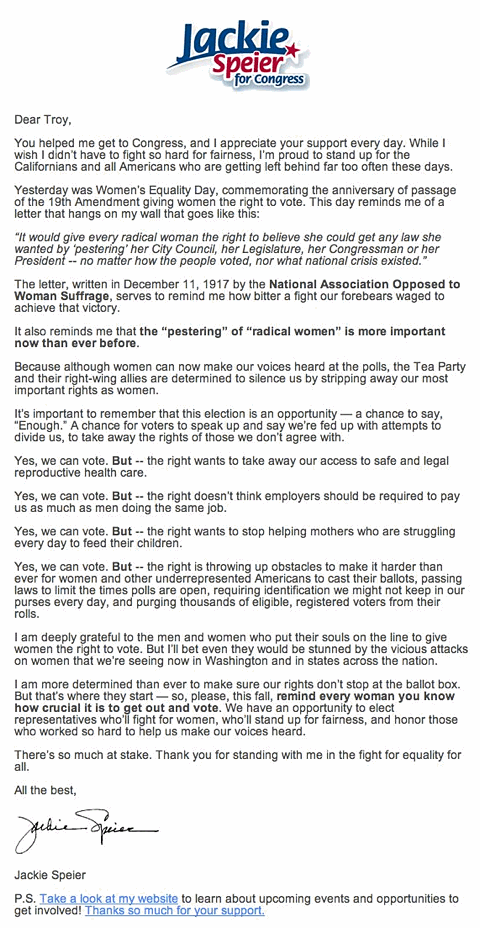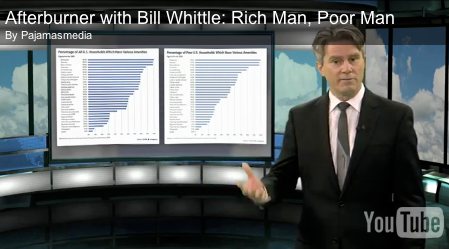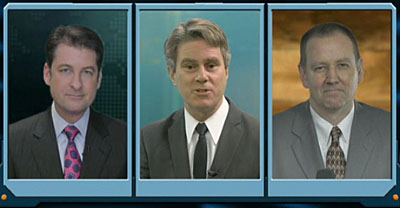Happy Independence Day! Episode 4 of “The No Fear Pioneer” is up!
Where do we go now?
by Troy Stephens
Monday, December 17, 2012
Given the way Bill Whittle’s extraordinary “Silent America” essays saved me from isolation and despair years ago, it should have come as no surprise that a series of new videos from Bill was the first thing that gave me any reason for hope after the re-election of Barack Obama in November. More than that even, Bill’s words and ideas in these videos made me feel unexpectedly energized about the prospect of a way forward. Watching them is no small time commitment, but neither is saving our beloved USA, and I can vouch for the fact that Bill doesn’t disappoint. His sober but undaunted thinking seems like exactly what we need now.
I started with “A New Beginning…”, the November 7, 2012 episode of Bill’s semi-regular video podcast, “The Stratosphere Lounge”. In it, Bill advances a big-picture idea that looks beyond the process of politics-as-usual that has repeatedly failed us, to postulate a tectonic cultural shift that may now be possible: American citizens voluntarily contributing to the building of parellel private-sector institutions that will put their sclerotic, unsustainable government counterparts to shame by the comparison of results they produce. There’s more to it than that, and Bill explains and motivates his idea in much greater depth than I can hope to effectively summarize, so by all means give this a watch if you can.
Bill’s thinking seems to me to contain echoes of Virginia Postrel’s “Dynamism”, with a key idea being emphasis of decentralized, voluntary initiative in diverse and numerous laboratories of innovation over attempting to shape the future through rigid central planning.
The book Bill mentions in this video, “The Starfish and the Spider”, is available on Amazon, by the way.
If you might only find time to watch one of these videos, I’d probably suggest starting with “Where do we go now?”, Bill’s talk at the November 12, 2012 Hancock Park Patriots meeting, which is followed by an unmissable Q&A session (OK, OK, that makes two videos) in which Bill demonstrates how an effective President of the United States would handle key issues and address a press corps that actually did its job and asked tough questions:
As I remarked and quasi-summarized in my Twitter timeline after watching “A New Beginning”:
Bill’s is a big dream, but dammit, everything worth having in this country was built by people who dreamed big. It can be done!
Focusing only on the next election is the trap we keep falling into; it’s how we keep losing ground. It’s the best our opponents can hope for. Progressives/Alinskyites have a long-term plan that has changed the culture over decades. That’s the game we need to play, but there’s more…
Our existing cultural institutions — education, entertainment, space exploration — are lost. They are tied to a sinking Leviathan of a state. Our only hope is to build voluntary parallel institutions that outshine them, that will show by comparison what miserable failures they are.
The good news: Culture leads; government only very slowly reacts and follows and struggles clumsily to adapt.
Our present centralized government is born of the Industrial Revolution, a by-gone age. It’s unlikely to survive the next big paradigm shift. It’s ossified, rigid, slow-moving, and economically unsustainable. The future requires dynamism, adaptability, decentralization.
Progressivism’s idea of “Forward” is the dinosaur in the room. It’s rigid, coercive, glued to theory that doesn’t flex when reality defies it. Think of all the technological revolutions that have blindsided us in our lifetimes, that few saw coming, and the impact they’ve had. Things we’re incapable of planning for end up mattering the most. Progress is what happens while Progressives are busy making other plans.
Anticipating what might be the next wave is hard enough. Trying to engineer a rigidly defined future is a losing battle. Dynamism wins.
So many genuinely smart people know just enough to think they can engineer the world. If engineering has taught me anything, it’s humility. Solvable problems have to be very tightly constrained, conditions for solving them clearly defined. Reality can ruin your whole day.
We know what doesn’t work, or works clumsily at best and seems doomed to collapse under its own weight and inertia, but what’s the alternative? What are the practical mechanics of a way out? Building parallel private-sector institutions whose success puts their government rivals to shame.
The crux of Bill’s idea: Pay your taxes. Write that off as gone, lost. Forget it. Budget some of what’s left to help build something better.
It’s a grand and vague idea in some respects, but I do believe with the right approach this can work. Government can’t compete with private sector dynamism.
I stand by that assessment, and I have hope we’ll find that some variant of Bill’s ideas on this will provide a real and achievable way out. If you yearn to reclaim our future as I do, by all means please give Bill’s latest work a hearing.
So Long, California
by Troy Stephens
Tuesday, September 4, 2012
On receiving a campaign email titled “Every Radical Woman” last week from my former Congresswoman, Democrat Jackie Speier, whose mailing list seems to have mis-classified me as a supporter, I felt compelled to reply.
I suppose I might have saved my energy and let this one go — I no longer live in California, after all — but its cynical and disingenuous attempt to tar the pro-liberty Tea Party movement as somehow anti-woman, as part of the bombastic “war on women” meme that today’s Democrats seem to hope will distract from their out-of-control spending and abysmal failure on the economy, was too far beyond the pale to go unchallenged.
On a range of issues culminating in Speier’s enthusiastic support for the legislative and financial disaster known as ObamaCare, whose detractors her campaign vilified as fear-mongering extremists, I never felt Congresswoman Speier represented my positions or values. Thankfully, we are now both relieved of the representative-constituent relationship, as I explained in my emailed reply:
You may wish to update your contact list. I did not vote for you, but you may thank me for relieving you of the burden of representing me.
After 33 years in California, some of it lived as a moderate Democrat, I have given up on my beloved home state, and departed with my productivity and entrepreneurship in search of places where fiscal sanity is practiced. I have been much happier for it, and have not had cause to look back.
As one municipality after another goes bankrupt, while voters refuse to do the difficult grown-up work of reining in out-of-control spending, my only remaining hope for the state of my birth is that it may serve as a warning to the rest of the country before it is too late.
Suffrage was and remains a fine and just achievement, but it’s an irreversible milestone from which society has rightly moved on. Today’s authentically “radical women” are those who challenge the regnant orthodoxy of unsustainable, infantilizing nanny-state feminism and are routinely vilified for it. The overwrought notions that calling for fiscal responsibility somehow constitutes a “war on women”, or that the economy- and liberty-focused Tea Party represents a resurgence of anti-feminist social conservatism, are farcical and disingenuous scare tactics, and I suspect most of those who promulgate these desperate fallacies know that. If there is a war on women, it is nowhere more manifest than in persistent unemployment that disproportionately affects women -- the foreseeable result of decreasingly competitive, increasingly business-unfriendly economic policies. What will most help women is what will help us all: a return to smaller government and fiscal sustainability.
For my part, I’ve had enough of fiscal denial, and the ugly and cynical politics of fear, envy, and entitlement that have fed this crisis, having left in search of places where the pioneering American Idea still thrives. I will go wherever I have to to escape the ruinous advance of Progressivism -- a philosophy whose state mechanisms, as California’s 33rd governor aptly put it, resemble nothing so much as my newborn’s alimentary canal -- with an insatiable appetite at one end, and no sense of responsibility at the other.
I do hope California can be saved. I’m done waiting and wishing, against all evidence and common sense, for it to happen, and I leave the state to those who seem to think they know better.
You’re welcome.
Your Former Constituent,
Troy Stephens
A snapshot of the campaign email to which I replied:
Losing Václav Havel
by Troy Stephens
Wednesday, December 21, 2011
This week saw the loss of two of humankind’s best, followed by the departure of one of the world’s worst villains. I’ve written a brief reflection regarding Václav Havel below, and will try to get to commenting on Christopher Hitchens’ and Kim Jong-Il’s passing when I can manage to seize a bit more time. (Joshua Treviño probably framed the odd trio of passings best: “I’d like to think God let Havel and Hitchens pick the third.”)
Václav Havel, Czech playwright and dissident who inspired millions with the courage of his convictions and went on to lead a liberated Czech Republic after the 1989 fall of Communism across Eastern Europe, succumbed to a long respiratory illness and passed away last Sunday. As one who loves and celebrates liberty, and whose mother’s parents were Czechs who emigrated to France in the 1920s, I feel a strong appreciation of Havel’s acts of steadfast courage in the face of gloomy odds. The Czech story in the 20th century was an especially sad one: Just as Czechs began to loosen the shackles of over two decades of self-inflicted communism during the Prague Spring of 1968, Soviet forces invaded and imposed a stricter communist regime that halted the liberalization. This, in a once free and democratic nation.
I will always remember a several days’ visit with my parents and sister to what was still “Czechoslovakia” in 1985, during which we managed to see Prague and a bit of Plzeň, and visit some extended family. The Prague of the time was the gloomiest place I had ever been, gray and desolate with the scaffolding and rubble of languishing construction projects, and their accompanying “5 year plan” signage, everywhere. Restaurants were nearly empty, and it seemed as if people rarely left their homes. One cousin, who worked for a television station, was afraid to be seen meeting with Americans. Years later, we heard of his disappearance; the family suspected he had been taken to a labor camp, as commonly happened to political dissidents during that time. Everywhere along the roads, propaganda billboards proclaimed the virtues of Communism, or the vices of Capitalism, in their characteristic style, yet the world around them seemed still, unmoving, almost abandoned. (I recall feeling my stomach sink years later, on seeing a familiar Czech anti-capitalist poster in the home of a left-leaning work colleague — another of the many signs I’ve seen, of the Western left’s misguided admiration for the malignant ideology of communism.) I recall the generous and unreserved hospitality of cousins who welcomed us into their homes, and one cousin’s fascination with the under-the-hood workings of what we thought of as our very simple, run-of-the-mill rental car — a Ford sedan with a modest 4-cylinder engine. It was a fascinating marvel to him, like nothing that the state auto manufacturer, Škoda, produced. And perhaps most of all, I remembered the presence of armed soldiers throughout the country, and in particular guarding the borders, where they searched the trunks of cars not only entering but leaving the country. My teenage angst was put into its proper perspective by contact with people who did not enjoy the freedoms and standard of living that I foolishly took for granted. I remember thinking, if one was ever to feel so gloomy about the world as to think life was not worth living, it would be a far better thing to risk one’s life helping people who wished to to escape a place like this. Within years, that kind of action became unnecessary. The collapse of Soviet communism gave Czechs and Slovaks another chance at freedom, and they seized it as well they should. I had the opportunity to return to Prague in 2005, for a few days after Christmas, and it gave me great joy to see the city revitalized, alive, thriving, and free. For leadership that helped make that dream a reality, and courageous persistence that kept a candle of hope lit through the many dark years before it could be realized, today’s free Czechs will forever be in Havel’s debt. The world has too few who share his deep devotion to freedom and commensurate dedication to advancing it, and he will be greatly missed.
Two noteworthy Havel quotes from my Quotes page:
On economics:
Though my heart may be left of centre, I have always known that the only economic system that works is a market economy… This is the only natural economy, the only kind that makes sense, the only one that can lead to prosperity, because it is the only one that reflects the nature of life itself.
Evil must be confronted in its womb and, if it can’t be done otherwise, then it has to be dealt with by the use of force.
Bill Whittle's Voter's Guide to the Republican Party
by Troy Stephens
Tuesday, December 20, 2011
Not to be missed: Bill Whittle’s latest and greatest Firewall. Everything you wanted to know about those mean, nasty, evil, really not very nice Republikkkans, but were afraid to ask:
(via Phineas at Public Secrets, care of @sistertoldjah)
What We Can Learn From the Gratitude of Immigrants
by Troy Stephens
Wednesday, September 28, 2011
Anecdotes such as this should put our domestic self-criticism in perspective, and remind us how very much we have to be grateful for. These are the people who flock to frontiers without hesitation, and build prosperity out of little more than freedom, opportunity, determination, and irrepressible optimism. May we always welcome such appreciative new citizens:
On Constitution Day in Philadelphia, 48 new Americans were naturalized, representing 18 countries from Argentina to Vietnam. The citizenship candidates and their families filled a small auditorium, they sat through welcoming speeches, including one from retired U.S. Supreme Court Justice Sandra Day O’Connor. They understood that it was a big deal.
They were an appreciative, demonstrative audience, if not Emma Lazarus’ “wretched refuse” of a teeming shore. Many are educated, with their eyes fixed on a shiny future as Americans. They might not all succeed, but they know they are free to try, so they are not complaining.
For the small number of you who think that America is bad, or mean, or evil, come convince our new Americans. You’ll die trying.
They don’t measure America by a dreamy, utopian ideal, they judge America against realities of the world in which they had lived. Despite wars and recession, they cast their lot with us because they know that in the totality of liberty, opportunity and equality — even the freedom to fail and try again — America is matchless.
To some of you, this is flag-waving fiction. To our newest Americans, who have lived here for years while qualifying for citizenship, it is fact.
Rich Man, Poor Man
by Troy Stephens
Wednesday, August 10, 2011
Bill Whittle’s latest Afterburner, “Rich Man, Poor Man”, is one of his finest. Watch it at Public Secrets:
In the grand scheme of things, we should indeed be celebrating this precious Civilization of ours, and its demonstrated, unrivaled ability to elevate everyone’s standard of living by liberating creative people to do what they do best — invent, innovate, and serve the wants and needs of others. It has taken a campaign of perspective-distorting envy and bitterness and cynicism sustained over decades to bring large numbers of us to believe otherwise, against all evidence.
The Free Frontier: How Private Enterprise Is Winning the Space Race
by Troy Stephens
Tuesday, February 15, 2011
Bill Whittle, doing what he does best. Does this inspire you like it does me?
Followed up by a great discussion on Trifecta:
Capitalism in Space: Private Enterprise Is Winning the Space Race
Published a New "Quotes" Page
by Troy Stephens
Sunday, February 7, 2010
I’ve made a habit, for some years now, of collecting quotes that strike me as profoundly insightful or interesting, probably for all the same reasons that others do — for the keenly focused insight and concise expression of ideas they offer, as well as the inspiration and distilled wisdom they can call to mind on a moment’s notice.
Having recently sifted through the assortment of text files where I’ve been gradually stashing these hand-selected quotes away, I’ve assembled the best of them into a new “Quotes” page that I invite you all to visit.
The topics include Liberty & Economics, Cultural Confidence, War, and keeping Perspective. I hope my readers will draw as much enjoyment from them as I have.
UPDATE 2010-02-08: I’ve added several more selected gems, dug out of a handwritten journal I’ve kept off and on since September 2002. Enjoy!
Another Call for World Government
by Troy Stephens
Tuesday, December 9, 2008
Via Drudge: Gideon Rachman in the London Financial Times (emphasis mine):
Even in the EU – the heartland of law-based international government – the idea remains unpopular. The EU has suffered a series of humiliating defeats in referendums, when plans for “ever closer union” have been referred to the voters. In general, the Union has progressed fastest when far-reaching deals have been agreed by technocrats and politicians – and then pushed through without direct reference to the voters. International governance tends to be effective, only when it is anti-democratic.
And yet, the author seems nonetheless to favor the idea, both throughout the article and in his closing:
The world’s most pressing political problems may indeed be international in nature, but the average citizen’s political identity remains stubbornly local. Until somebody cracks this problem, that plan for world government may have to stay locked away in a safe at the UN.
Pesky, provincial voters! Where is their vision? Clearly there’s a need for someone to “crack this problem”. The will of the unwashed masses can’t possibly be allowed to stand in the way of global progress.
The most frightening thing about the idea of a single world government is precisely what gives it such appeal to those who would see themselves in positions of power within it: There is no escape (short of a rocket ride to an as-yet-nonexistent off-Earth colony, and who knows even then what the governing arrangement with the mother planet will be?). Don’t like the regulatory climate, taxation scheme, or laws abridging free speech or free exercise of religion where you are? Tough. That’s the way it will be, everywhere.
Thanksgiving Thoughts
by Troy Stephens
Friday, November 28, 2008
…of others — still just as relevant the day after:
Victor Davis Hanson: “Some Random Politically-incorrect Reasons to Be Optimistic on Thanksgiving Day”. (Appreciation of dedicated pilots and the wonder of air travel hardly seems “un-PC”, but I suppose his other points qualify.)
Bill Whittle celebrates the life of a friend recently lost.
Neo recalls a Thanksgiving spent alone, in “Thanks for the burger, but no thanks”. (I’ve been there!)
When giving becomes a crime
by Troy Stephens
Wednesday, November 26, 2008
Roger Kimball on a ridicule-worthy legal absurdity in Strasburg, Illinois:
On one side you have these preposterous petty tyrants (in the case of IDOL, they’re called “conciliators”–how George Orwell would have like that!) armed with the power of the state, on the other side you have individuals and local communities endeavoring to stand on their own two feet and live their lives without “bailouts” and unmolested by state interference.
But such autonomy is the one thing these miniature despots can’t abide. They don’t want people to be independent. They don’t want local communities to take care of their own needs. They want to meddle. They want to be the sole source of sustenance and labor–and they want to do it, of course, on their own terms, enforcing their own requirements for who gets to work, when, under what conditions, and how much they are paid. This, as Friedrich Hayek observed, is the road to serfdom.
"Party of Privilege"
by Troy Stephens
Tuesday, November 25, 2008
John Agresto at NRO, courtesy of Ed Driscoll:
This, by the way, is why Sarah Palin was so refreshing and, to be clear, so exotic to all the elites: a woman who could raise herself up by dint of hard work and self-sacrifice to be a wife, mother, mayor, and governor. She didn’t do it by set-asides, by birth, by quotas, or by handouts. She did it as a woman and she did it by her efforts. She exemplified what we all once saw as America—a land of opportunity, where you could be anything you set your mind to be so long as you worked for it. She showed us something about both her character and ours, our old-fashioned American character. For all this, she had to be ridiculed—she represented a kind of American virtue that shames the privileged, whether they be rich or poor.
But maybe we as a party have boxed ourselves in. We believe that prosperity will trickle down from the success of the prosperous and we believe (or have been shamed into believing) in the superior moral status of those whose only job is always to ask for more. But the shiftless have no greater moral claim than others, and prosperity doesn’t always trickle down from the top. It wells up from the efforts of the working classes, the middle classes, the builders, doers, and makers of America. And it’s not just small-business owners who are the backbone of America but the clerks and sales people and night watchmen in those businesses.
The poor knew Obama was on their side, and the liberal rich were always in his camp. (If it’s simply “the economy, stupid,” and not culture and values, then why does Connecticut always vote Democratic and West Virginia not?) No, the strange thing was that the party of self-reliance, of initiative, of productivity and hard work, the party of cops and soldiers, firemen and farmers, hunters and ranchers—the party of ordinary American virtue, not privilege—allowed itself to look like the party of big oil and bailouts. How bizarre it was to see a plumber trying to come to our rescue and tell us what to say; but it was already too late.
"Ten Random, Politically Incorrect Thoughts"
by Troy Stephens
Ample material for ten insightful articles, condensed into one. Don’t miss Victor Davis Hanson’s latest: “Ten Random, Politically Incorrect Thoughts”.
Lots of good stuff to catch up on
by Troy Stephens
Saturday, November 15, 2008
I have more writing in mind that I hope to get to, including posting some brief post-election thoughts that I’ve been mulling over. Meanwhile, I’ve been occupied by the flood of particularly worthy and interesting writing by others that the election seems to have prompted. Following are some highlights that I’ve bookmarked with the intention of pointing them out, including some sober and probably sorely needed self-assessment from libertarian/conservative thinkers:
WSJ: Same Old Berlin Wall
One benefit of a Democratic Presidency is that it will expose the myth that U.S. disagreements with our nations are all the fault of the Bush Administration. Take the failure of NATO, and especially Germany, to supply more troops for the war in Afghanistan.
…
The Continent’s free-riding on U.S. security while criticizing the way that security is provided predates the Bush Administration and will outlive it. President Bush has mainly provided Europeans with an excuse for refusing the kind of cooperation they’d rather not provide anyway. Mr. Obama has promised a multilateral surge of troops into the Afghanistan-Pakistan front. He may find, like Mr. Bush, that most of those troops will have to be American.
James Lileks reminisces in “SuddenlyEnlightenedLand”:
Hey, remember after 2004, when the interior of the country was viewed with deep suspicion for its insufficient interest in a John Kerry presidency? Crude maps called it JESUSLAND, a place opposed to liberty and education. Well, shuck my corn and call me Orville: the red part of the country has been reduced to something that looks like a mild case of contact dermatitis.
The solid block of flyover Christiansts who spend every Sunday hopping up and down so they can get a head start on the Rapture appears to have turned into enlightened change-agent lightwalkers, and in a mere four years. Or, the people in the middle of the country weren’t all weirdoes who still harbored a grudge against the Renaissance, and viewed the coasts as they were greedy remoras fastened on the Real America. In any case, no one will make mocking maps of them now.
I remember well the mocking of “Jesusland” that immediately followed the 2004 election, from the supposed standard-bearers of “tolerance” and “diversity”. It was one of the experiences that helped clarify for me that only certain kinds of diversity are to be embraced and celebrated in the contemporary multicultural order, and that certain utterances get an exception from the usual concerns about “hate speech”. I felt deeply ashamed of fellow Californians who I saw engaging in this disparagement of their countrymen, this tarring with a broad brush of stereotypes that would surely be condemned if applied to any other culture or group of people. The sight of a “Can we secede yet?” sign enthusiastically brandished at a San Francisco protest that broke out after the election filled me with gloom and despair. I heard people on the left threaten both before and after the election that they would leave the United States — move to Canada, Europe, or some other such haven of decency — if Bush were to win (or “steal”?) a second term. I heard the same threat repeated again before this year’s election, both from celebrities such as Susan Sarandon and from others around me. Katie Granju had a good response to that kind of talk, I think:
[I]f your civic investment in American democracy is so weak that it hinges on one single candidate or issue or election, then you probably would be happier elsewhere anyway…
As for the outcome of those threats/promises back in 2004, I feel entitled to complain that of all those who vehemently insisted that they were leaving the country, not one of them has sent me a postcard. Because they’re all still here!
Lileks continues:
The lesson, as always, is that things change. Things will change again. And I expect that the GOP leadership will conclude that since things do change, they can sit back and wait for it to happen again. Which is a recipe for ensuring that the next such map has a thin red line like the one you used to use to open a Band-Aid.
There does seem to be a risk of taking political pendulum swings for granted. Pendulums can get stuck, you know.
More from Lileks in “Monday delights” (see the original post for the accompanying graphic):
Conservatives cannot help but be saddened and left out – the only possible event that could lift their spirits right now would be a headline that said REAGAN, BACK FROM THE DEAD, EATS BIN LADEN AND CRAPS TAX CUT, but pictures like this reminds the right that no one was ever this happy about Bush, even when the love was at its zenith. No one put him with George, Abe and Frank before he took office. Really, he was just The Next Guy, a caretaker in a post-history world. People forget how much “compassionate conservativism” stuck in the craw back then; the party’s own standard-bearer modified the terms in a way that managed to insult, mischaracterize, apologize, and reshape the debate all at once. It would be like a Democrat running on a program of “Logical Liberalism,” and not knowing why his own followers found the catch-phrase unhelpful.
Anyway. There are rumors of new Executive Decrees, which include magic Federal dollars for stem-cell research that uses human embryos - if you have any objections, you hate science - and a ban on domestic drilling and nat-gas exploration in public lands in Utah. (If you have any objections, you hate the environment.) The two form a nice mirror image: the former was a ban put in place to preserve a particular definition of human life; the latter is a ban lifted to preserve the environment. Again, it’s understandable: we only have one Utah, but we can always make more people. As long as they don’t live in Utah.
Will executive unilateralism remain a bad thing, a threat to our rights, or suddenly gain favor with old critics? Hmmmm. Cue the Jeopardy! theme. That’s a stumper
Mark Steyn: The Death of the American Idea?
While few electorates consciously choose to leap left, a couple more steps every election and eventually societies reach a tipping point. In much of the west, it’s government health care. It changes the relationship between state and citizen into something closer to pusher and junkie. Henceforth, elections are fought over which party is proposing the shiniest government bauble: If you think President-elect Obama’s promise of federally subsidized day care was a relatively peripheral part of his platform, in Canada in the election before last it was the dominant issue. Yet America may be approaching its tipping point even more directly. In political terms, the message of the gazillion-dollar bipartisan bailout was a simple one: “Individual responsibility” and “self-reliance” are for chumps. If Goldman Sachs and AIG and Bear Stearns are getting government checks to “stay in their homes” (and boardrooms, and luxury corporate retreats), why shouldn’t Peggy Joseph?
He’s got a point.
Along that line, a particularly sobering assessment from the inimitable P.J. O’Rourke: “We Blew It”. As I’ve said before, I generally part company with O’Rourke on issues of war (roughly speaking, he’s more of a “Big ‘L’ Libertarian”) but he does make good points on a number of other topics.
[M]aybe this is again the early 1930s, ushering in 20, 30, 40 years of soft socialism and cynicism about markets, a bent for the bosom of the organized state over the seemingly fractious pursuits of individuals. It did happen before in America. If hard times instead freeze opinions in place, then we may be looking to a long haul.
Short term or long term, what is to be done by those still enamored of an America “conceived in liberty”?
(Hat tip: Instapundit)
On a related note, Fred Smith wrote before the election, on Oct. 15th:
A world where economic interests are disenfranchised - indeed, even de-legitimized - is a world that will have little regard for economic - and, thus, indivdiual - liberty.
Accompanying all of this, fresh threats from a seemingly forgotten enemy: Via ABC News: Osama Bin Laden promising an attack that “Will ‘outdo by far’ the attacks of September 11” and will “change the face of world politics and economics”.

A promise that al Qaeda, in its present state, is capable of carrying out? — or just bluster? Let’s hope we won’t have to find the hard way.
"What I Saw at the Obama Revolution"
by Troy Stephens
Thursday, November 6, 2008
I suppose I got caught up in the emotion of the night due almost exclusively to the genuine and copious tears of black Americans. The ones I spoke to and interviewed were nearly speechless with joy. With a start, I realized something that had escaped me all these long months of writing and thinking about this race. For many African-Americans, this election was a spiritual event, something that transcended the corporeal and brought to mind ancestral yearnings and desires for freedom.
For perhaps many blacks, Obama is the word made flesh — the redemption of the promise in the Declaration of Independence that “all men are created equal.” The small sample of blacks I interviewed all spoke of the shattering of barriers, the hope that an Obama presidency would translate into a more just society, and the belief that for them personally, their lives would never be the same.
It struck me then and now that the world has turned upside down. When I was a boy, a black man could not get a sandwich at a lunch counter in much of the country. Now a black man has been elected president of the United States, receiving more votes from whites than his predecessor of 2004.
Commenter “portia9” cautions poignantly:
Where I come from, no matter how smart you are, no matter how hard you work you are extremely unlikely to ever achieve the kind of success that is available to citizens of the U.S. If by some unbelievable stroke of fortune you do achieve it, you will be taxed very heavily, penalized really, for your efforts. There is no can-do spirit. There is nothing like the “American Dream” because that dream exists nowhere but here.
Everything that I have learned about President Elect Obama leads me to believe that he does not cherish the American Dream. He does not believe in it, although, ironically, he is a prime beneficiary of it. He would rather remake this country in the image of those his friends and allies like William Ayers cherish. Socialist countries. Communist countries.
In the decade I have lived here, I have come to realize just how precious the much maligned “American Dream” really is. I was taught as a university student in Canada that it is a fiction, but I have learned through living here that it is real. Socialism is not the answer for this country. America has made a devastating choice this election. I only hope that he will not be able to change this country so much that it will be unrecognizable in four years.
I hope that Obama’s actual performance in office won’t merit these fears, but I fear portia9’s concerns are well-founded.
Scrooge McDuck Lives!
by Troy Stephens
Another brilliant Lileks piece I can’t help but link: “Crime Does Pay.”
My child no longer participates in Toontown, an online consensual hallucination provided by Disney. I’m glad; it had promise, but seemed limited, the graphics were chunktastic, and your character had names like Merry Flippy Pantswhistle. What annoyed me most were the foes the toons had to battle for jellybean points – they were called Cogs, and they were all businessmen, various forms of capitalists in robot form. The Disney execs who signed off on the project must have a big bin outside the office where they could place their sense of irony before heading in to work.
Don’t miss the pictures and the rest.
Read the Screed. It’s what you need. :-)
“Rich” is like “racist”
by Troy Stephens
Tuesday, November 4, 2008
New Screed, same James Lileks: Let Me Tell You About You, pt. 2
As a wise man said: half the people in the country live below the median income level. Half. In this day and age. So if you don’t want to help them - that’s what you mean when you oppose taxes, after all - you’re selfish. If you protest that you’ll have to spend less, or invest less, or save less, or give less to charity, well, you had better start making more money, then. Go on; out to the woodshed; squat over that straw nest and pop out some more golden eggs, or whatever it is you do. Incidentally, you should spend less, because you spend money on things you don’t need, and we don’t have to know what they are to know you don’t need them, just like we don’t have to visit your house or neighborhood to know that the former is too big and the latter too far away.
Brilliant!
Obama and Redistribution: 2001 Radio Interview Reveals Much
by Troy Stephens
Monday, October 27, 2008
Joe the Plumber wasn’t the first person to get Barack Obama to admit his position on wealth redistribution….
The referenced excerpt from a 2001 radio interview with Senator Obama, now on YouTube (follow the above link), is the lead story on Drudge today too.
Somehow Obama’s condescending mockery of “Joe the Plumber” seems less surprising now, though no less troubling.
Update:
Glenn Reynolds comments:
Maybe it’s just because I’m a law professor who’s followed Obama, but this is no surprise to me. Or to Jennifer Rubin. In fact, this is pretty standard stuff in large parts of legal academia.
Bill Whittle responds to the story with a short essay, “Shame Cubed”:
We have, in our storied history, elected Democrats and Republicans, liberals and conservatives and moderates. We have fought, and will continue to fight, pitched battles about how best to govern this nation. But we have never, ever in our 232 year history, elected a President who so completely and openly opposed the idea of limited government, the absolute cornerstone of makes the United States of America unique and exceptional.
If this does not frighten you – regardless of your political affiliation – then you deserve what this man will deliver with both houses of Congress, a filibuster-proof Senate, and, to quote Senator Obama again, “a righteous wind at our backs.”
Comment thread for Bill’s post here.
The Saga of Joe the Plumber Continues
by Troy Stephens
Monday, October 20, 2008
Some articles of particular note:
Claudia Rosett: First They Came for Joe the Plumber…:
Within days, reports were all over the news that Joe owes back taxes, he doesn’t have an Ohio plumber’s license, his real name is Samuel, and he is — shock and horror — a registered Republican. Within days, Obama and Biden were holding up Joe to public ridicule, and by implication mocking any American working stiff who might have the audacity to want to earn more than $250,000 per year.
Obama may be full of talk about delivering the American dream, but he apparently has enormous disdain for Americans who actually sweat to earn it for themselves. He wants to take Joe’s money and spread it around in the name of helping others get ahead — but if anyone gets ahead more than Obama deems fitting, watch out.
Ruben Navarette Jr.: The Democratic Party’s Drubbing of Joe the Plumber.
Iowahawk: I AM JOE
Like Iowahawk, I’m finding that the attacks on Joe the Plumber have made me angrier than almost anything else in this long and nasty campaign.
Power Line: Two faces of socialism:
Barack Obama’s candid comment to Joe the Plumber about “spreading the wealth around” brought back memories of a similarly candid moment during Robert Kennedy’s 1968 campaign.
The criticisms of Joe Wurzelbacher have reminded me of a quote from “The West Wing” that I took note of around the time I started to sour on the show’s ideological bias and occasionally heavy-handed rhetoric: “That’s the problem with the American Dream,” intoned the fictional President Bartlett, in frustrated in response to the notion of people having the audacity to complain about their taxes being too high. “Everyone worries about when they’re going to be rich.”
Because hey, higher taxes are OK as long as it’s somebody else who’s paying them, right?










